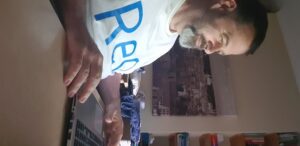
Like most of us, this is not the August I imagined. I won’t bore you with the same tale, you have heard told again and again. Suffice to say, the image on the left tells its own story.
What I would like to talk about is new work, the emergence of a new medium, and ways of viewing and understanding theatre.
A shutdown Edinburgh has led to the creation of plenty of online content. Creatives are finding their feet in different methods of storytelling. Fueled by relatively cheap recording equipment, and all the benefits of internet media sharing, the end product can be mixed. In a recent conversation, someone suggested that there is a grace period where poor quality production can be forgiven if the story is good. The concern was that this would not last, and style triumph over substance. I suspect there is some truth in that.
As well as creatives learning a new medium, we should also remember that audiences have to learn to watch these new shows. This was a point that struck me when I reviewed the excellent Last Exit to Brooklyn. Watching multiple Zoom windows, being able to look directly into people’s homes and watch them watch the show is mesmerising. You have their permission to be a voyeur. Their responses to the show are not hidden, in fact the intimacy of Zoom camera makes them all too real. You are not looking at them side-on, with both of you staring forward. It is our own Rear Window and I could have watched it for hours.
This intimacy, rendered through our personal camera’s, brings us closer together. It’s noticeable in some of the online productions that this immediacy is leading actors to make use of micro-expressions. Jokes, emotions and commentary are portrayed through the subtlest of gestures. A few years ago, actors were concerned about the impact of HD, and the revelation of flaws in ever greater detail. But TV and Film HD still has distance built-in, there is a remoteness that the use of personal devices removes. It will be interesting to see if this becomes a developing trend.
There have been many discussions amongst the theaterati about the shows being made. Usually, this is about how they are going to make money. Some have suggested that if the pandemic continues online viewing may become the dominant way of consuming theatre. Having partaken in many of these talks, there is little reference made to the viewer’s experience; what they see, and how it makes them feel. I find this trend worrying.
Whether artists like it or not, they are presenting onscreen, and that means competition with TV and Film in a way that they haven’t had to do before. This is why finding ways to add value, enhance the experience and show something different is so important. Our computers and phones cannot replicate theatres’ unique experience, the sharing of the moment with others. This is the reason the arrival of video failed to kill the now resurgent cinema industry.
I am hopeful that this new creative way will; reveal new talent, deliver compelling stories and a whole new viewing experience.
So, for most of this month I shall be sitting in front of my computer, watching online content and if I find something I like, I shall write about it. If it’s a short piece, I will include it an online review blog. Longer productions will get the full Fringe Review treatment.
Update 17/8/2020
I’ve just watched, Chris Arnold – My Life in Music which is part of the Ludlow Fringe Online. It was excellent, half hour joyous fun, a mini Spinal Tap for millennials. It is the inclusion in the Ludlow Fringe that raises questions.
This show is a made for TV production, it’s made with proper equipment, the videos look like real music videos, the editing is slick, sound quality is excellent and the credits are longer than my Xmas Card list. My point is not to criticise Chris, he has made a quality piece with the resources he has available. I’ve done a mini-review of it and it is well worth watching. The songs are outstanding.
But for an industry that is trying to bring the magic of the live show to the online world, this type of programming is where the future challenge lies. It’s easy for audiences to watch, understand and enjoy. The days of hand held phone cameras, mic’s that pick up everything, sloppy editing and lighting are slipping away quickly. The idea that you can just stand a camera up and do ‘your live show’ looks like it has already passed.


















































